Discloses President Cho of INU to visiting ambassadors, senior diplomats
By Publisher Lee Kyung-sik with Choe Nam-suk, Ms. Sua Kim
Incheon National University (INS) is obviously in good hands, President Cho Dong-sung in particular, and this was immediately apparent at a meeting with ambassadors and other senior diplomats who visited and toured various facilities of the University on May 28, 2019. The tour was organized by The Korea Post media, established 33 years ago and now owning and operate a total of five media outlets, including a Korean-language Internet and off-line newspaper and their English-language counterparts.
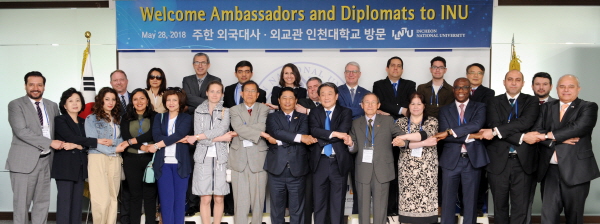
Participating in the tour were Ambassadors Thura Thet Oo Maung of Myanmar of Myanmar, Petris Varivas of Latrvia and Herbert Estuardo Meneses Coronado of Guatemala, and other senior diplomats and their spouses who, in alphabetical order, were from the Embassies Afghanistan, Belarus, Bolivia, El Salvador, Ghana, Paraguay, Peru, South Africa, Turkmenistan, Uzbekistan, Venezuela.
The state-run INS campus, sprawling on a vast reclaimed land estate of some 460,000 square meters in the fast-growing Incheon Metropolitan City, a major gateway to the Capital City of Seoul, had an ambitious plan, according to President Cho, to join the world’s top 100 universities in the foreseeable future.
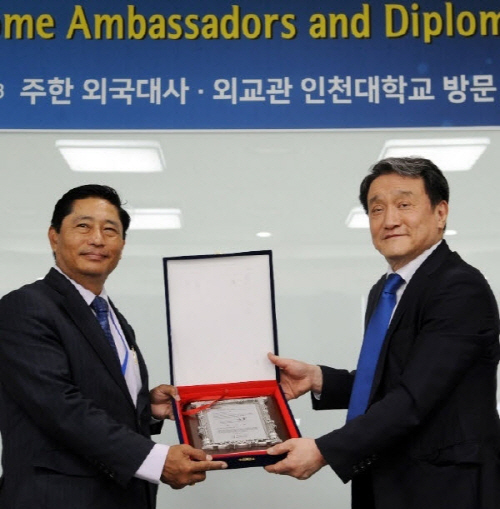
At the welcome ceremony, President Cho warmly received the ambassadors and other visiting senior diplomats with their spouses, and introduced the University in impeccable English.
Ambassador Maung of Myanmar, speaking on behalf of the visiting members of the Diplomatic Corps said that cooperation and interaction between the advanced educational institutions of the different countries of the world is becoming increasingly important today.
Then he said, “And in this respect, I would like to express our highest praise for the effort made by President Cho to invite us here today for such cooperation and exchanges.” (See excerpts from his speech at the end of this report.)
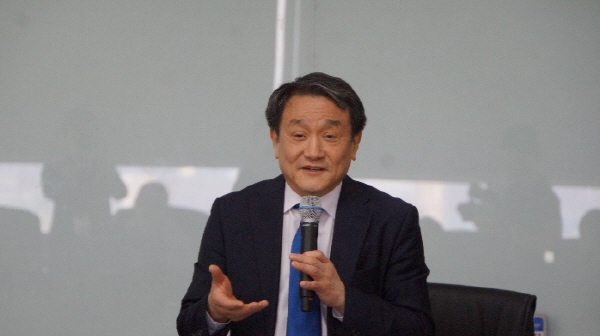
Among the highlights of the tour, was the presentation of scholarship of four years to one student from each participating country in the Diplomat Tour that day. It was a very generous offer and gesuture of goodwill between the Korean government and the children of the ambassadors in Seoul.
The Korean government and government-supported educational and academic circles in Korea are strongly interested in the promotion of cooperation between Korea and the countries diplomatically represented in Korea. President Cho of INU, in particular, had strong personal ambition to link Korea and all the countries of the world and promote understanding and cooperation between Korea and all the countries of the world. It appears that the offer of the attractive scholarship represents his ambition to bring the young peoples of Korea and all the countries of the world closer together.
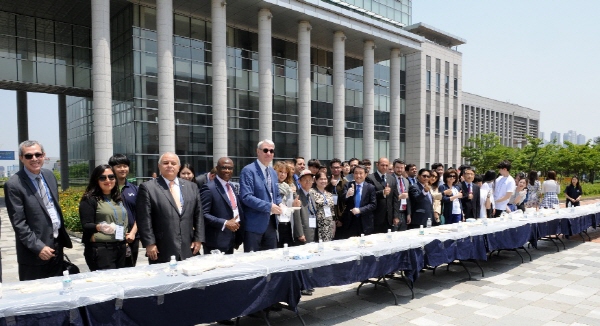
During the tour, to make it coincide with the aim of the University, a total of 100 students were selected to cut a 100-meter long Injeolmi Korean glutinous rice cake mentioned afore.
President Cho personally introduced the excellent facilities of the campus, including those of Matrix College, which was followed by an introduction by Director Chad Anderson of the International Exchange Institute concerning various programs of the University for the foreign students, including English language lectures for foreign students, scholarship programs and dormitories.
Following the introductory program, the visiting ambassadors and other senior members of the Seoul Diplomatic Corps (SDC) were invited to sign a Memorandum of Understanding concerning the payment of scholarships.
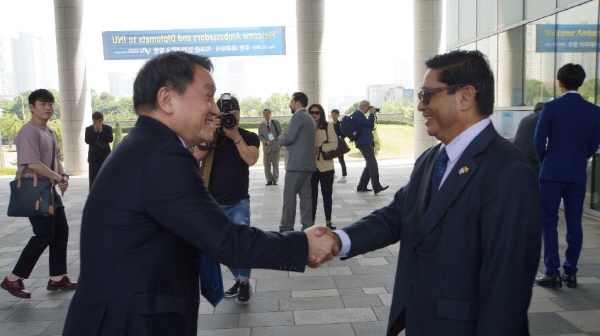
Then the visiting members of the SDC were led on a tour of the Observation Tower where English-speaking students of the International Student Supporting Community assisted the visiting diplomat dignitaries. From the top of the Tower, the visiting ambassadors and senior diplomats witnessed a good number of high-rise buildings surrounding the INU campus.
The visiting ambassadors and senior diplomats were visibly surprised when they heard President Cho say, “Not long ago, the entire area here a part of the sea!”
The campus of INU is located in the Songdo District of Incheon, which was selected as the world’s safest city by Numbeo’s Global Crime and Safety Survey in 2016. Forty percent of Songdo is green space. Residents walk or bike to work and school. Visitors enjoy the city’s boutiques, cafés, and lively restaurants. Just minutes from the INU campus, one can take a quiet stroll or glide in a canoe through Central Park’s beautiful 101 acres. Jack Nicklaus Country Club, the host of 2015 President’s Cup, is INU’s affiliated golf course.

INU is considered the fastest-growing university in Korea, one of the two flag-ship incorporated national universities, the other being Seoul National University.
Agreement between Kim Jin-pyo, Deputy Prime Minster and Minster of Education, and Hwang Woo-yea, Representative of National Assembly from Yeonsu-gu:
“We witness Cambridge challenging Oxford in the United Kingdom, Yale challenging Harvard in the United States, Kyoto University challenging University of in Japan, Tsinghua University in China challenging Peking University.
“We need to enable Incheon National University as a challenger to Seoul National University.”
INU has an ambition development plan.
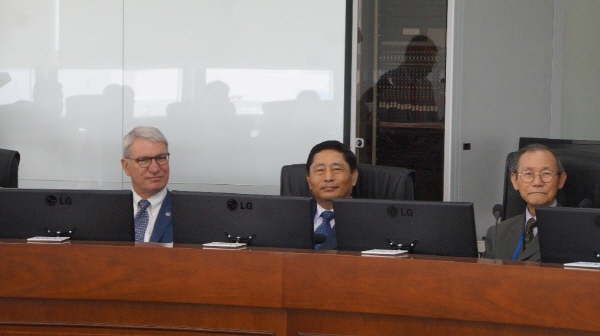
It aims to be a Global Top 100 University and its second target is to win the position of Global 1 (in the eyes of the next generation).
The vision of INU is also impressive. It has a three-stage development plan:
2018: An innovative university into the future
2020: An attractive university in the eyes of the young and the global (the percentage of international students increasing from 2% to 30%).
2026: The focused research university, grooming research excellence (grooming Nobel prize winners)
INU also has four-point strategy:
1. Customer’s point of view: Joint research with industry for long-term market performance
2. Future-orientation: No compromise with the present in reaching the dream.
3. Globalization: Going beyond Korea for universal standard, and
4. Effective mechanism: Objective, fair and transparent evaluation
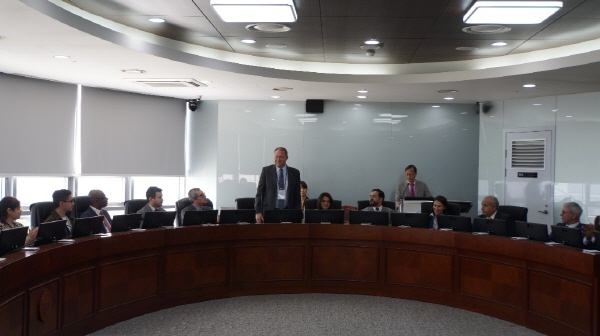
President Cho also has a unique view of the future. He states:
We cannot help believe that 50% of the current jobs will disappear in 10 years when we saw AphaGo soundly beating World Champion Lee Sedol of “Go” with 4:1.
Artificial Intelligence-led Industrial Revolution 4.0 has become a reality.
Universities in Emerging Economies are responsible for transforming their countries to SDC and FDC.
We must focus on grooming entrepreneurs, professional managers, engineers, and designers. And we must team up with companies/industries to realize this mission.
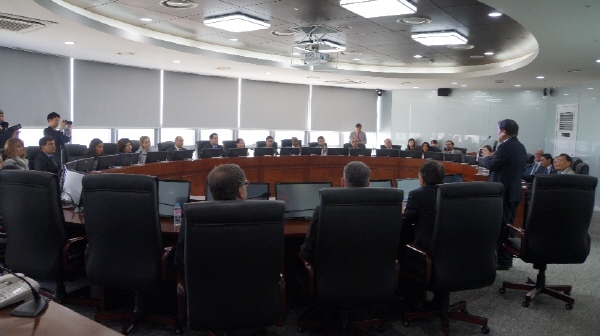
Excerpts from the congratulatory speech of Ambassador Maung of Myanmar:
On behalf of the members of the Seoul Diplomatic Corps visiting here today, I would like to express my heart-felt appreciation to President Cho Dong-Sung of Incheon National University for inviting us today, to visit and tour various wonderful facilities of your University.
Cooperation and interaction between the advanced educational institutions of the different countries of the world is becoming increasingly important today.
And in this respect, I would like to express our highest praise for the effort made by President Cho to invite us here today for such cooperation and exchanges.
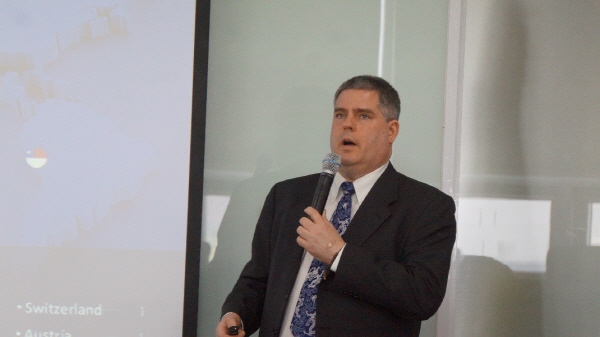
We understand that President Cho has laid out a bold and ambitious plan for making Incheon National University a top 100 global advanced educational institution.
His plan, we understand, provides a roadmap that sets out their goals for the next five years, which includes recruiting the most creative and brightest students, focusing on five 'peaks' of research excellence, providing students with a truly global education, and fostering innovative partnerships with industry leaders.
We have learned that at this University there is an exciting future ahead for the students and the changes you are making to become a world-class university and that you are providing your students with a future-ready education that equips them to be global change leaders.
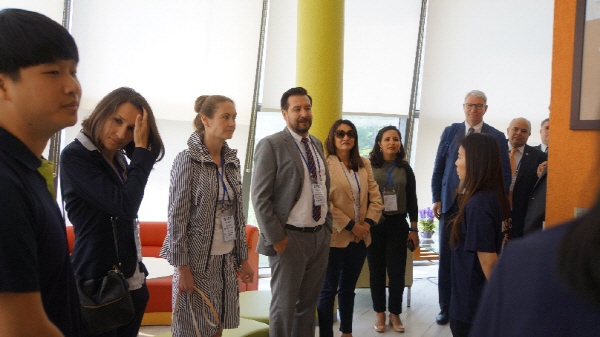
We also learned that from January 2013, INU was rechartered as one of the Flagship Korean National Universities in Korea, representing the Gyeonggi Province and the Incheon city.
We understand that President Cho has also laid out a bold and ambitious plan for making INU a top 100 global university and that this plan provides a roadmap that sets out their goals for the next five years, which includes recruiting the most creative and brightest students, focusing on five 'peaks' of research excellence, providing students with a truly global education, and fostering innovative partnerships with industry leaders.
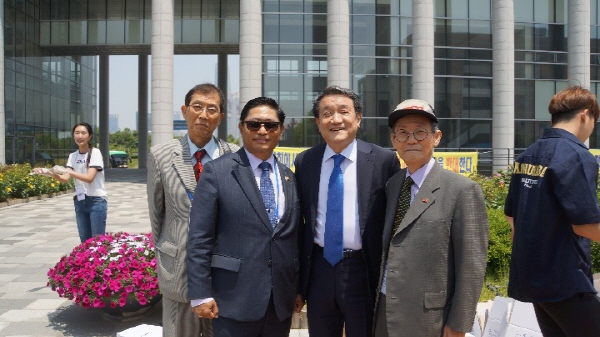
We also hear that there is an exciting future ahead for INU and that you are providing the students with a future-ready education that equips them to be global change leaders.
It is my sincere wish that all the aims of the University will come tree, those of President Cho, in particular. Gamsa Hamnida, Thank you very much.
About President Cho Dong-Sung of INU:
Dong-Sung Cho is 15th President of Incheon National University (INU), which is one of the two incorporated national universities in Korea along with Seoul National University (SNU). He was Professor of Strategy, International Business, Management Design, and Sustainability Management at SNU during 1978-2014, and Professor of Strategy at Cheung Kong Graduate School of Business (CKGSB) in Beijing, China during 2014-2016.
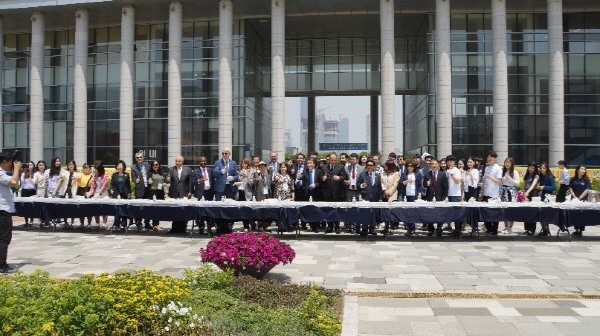
President Cho is going through a major transformation of INU into a global research university. Under his guidance, all of the 64 departments within the 11 colleges are concentrating their respective research capabilities in bio-technology-driven subjects. He has implemented the concept of company-on-campus by inviting 54 companies, research organizations, NGOs, and government-led institutions. He coined the word “Tri-versity” to explain INU’s educational philosophy of inviting students in 3 stages of life in the early 20s for college education, in the 40s and the 60s for postgraduate education. He has proposed the “International Teacher’s License” which will be conferred to jobless young people.
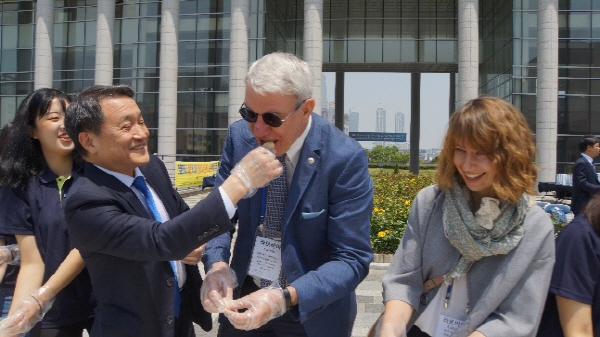
Those with the ITL license will then be dispatched to various parts of the world where developing countries desperately call for teachers. On July 10th, he successfully recruited Professor Sung-Hoe Kim of University of California-Berkeley as INU’s Chaired Professor. For his discovery of tRNA in 1973, Professor Kim has been repeatedly recommended for the Nobel Prize.
He received a doctoral degree from Harvard Business School in 1976, and worked at Boston Consulting Group in Boston, Massachusetts and Gulf Oil Corporation in Pittsburgh, Pennsylvania before joining SNU in 1978. He was a visiting professor at Harvard Business School, University of Michigan, Boston University, Duke University, INSEAD, Helsinki School of Economics (now Aalto University), University of Sydney, the University of Tokyo, Hitotsubashi University, Peking University, Zhejiang University, and Nankai University.
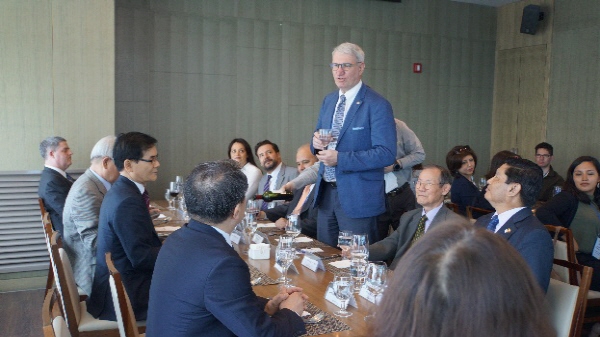
Among the 68 books that he authored or coauthored are 17 English titles that include The General Trading Company by Lexington Books (1986), Tiger Technology: the Rise of the Semiconductor Industry in Asia by Cambridge University Press (1999), From Adam Smith to Michael Porter: Evolution of Competitiveness Theory by World Scientific (First edition in 2000, Extended edition in 2012), Design Management, Management Design by SNU Press (2011), IPS National Competitiveness Research by IPS (every year from 2001 through 2016), International Review of National Competitiveness: A Detailed Analysis of Sources and Rankings, by Edward Elgar (2013), and Mechanism-Based View: The Fourth Paradigm in Strategic Management (planned for 2017).
Five of his books have been translated into Chinese language: 南朝鮮企業的國際經營事例 (人民出版社, 1991), SER-M 經營 (南開大學出版社, 2000), 决定女人一生的两种选择 (中国友谊出版公司, 2009), and 技术撬动战略: 21世纪产业升级之路 (北京大学出版社, 2009). The fifth book is being translated under the title 机制基础观点.
He wrote 3 novels, The Rose and the Wild Rose (2007) which brought him the “Literary Award for New Novelist,” and Itoh Hirobumi, Shooting Ahn Joong-Geun (2009) that has become the basis of the theatric play under the same title. The third book is Sequel to the Rose and the Wild Rose (2014).
He published 115 academic papers in major journals such as Organization Science, Research Policy, Journal of World Business, Journal of Management & Organization, Journal of Organizational Behavior, International Journal of Advertising, and Long Range Planning.
At SNU, he was Dean of the College of Business Administration, 2001-2003 and Dean of the Graduate School of International and Area Studies, 1999-2001. He also served SNU as the Founding Managing Director of SNU Development Foundation, which has led SNU as the pioneer in fund-raising in Korea. He was President of Korean Academic Society of Business Administration, which is the flagship organization in Korea representing 87 functionally-oriented academic societies in business administration. He also chaired Korean Association of Academic Societies, which is the umbrella organization of 651 academic societies that encompass humanities, social sciences, natural sciences, engineering, and others.
He has pioneered new frontiers in, and conducted extensive research into, management theories on the subjects of the General Trading Company (1978-1985), Korea's Chaebol Group (1985-present), National Competitiveness (1986-present), Design Theory and Management Design (1993-present), the Subject-Environment-Resource-Mechanism (SER-M) Model to categorically identify causes of the effects (1973-present), and most importantly the Mechanism-Based View (MBV) of strategy (1992-present).
He has actively researched into the issues of competitiveness of nations, competitiveness of cities, and nation brand, having published annual reports respectively on rankings of the 3 above-mentioned issues. He had consulted the governments of Malaysia, Sri Lanka, Honduras, and United Arab Emirates to increase the level of national competitiveness of each of these countries. He has actively promoted start-ups of college students since 2000. Since then, approximately 30 students at SNU started start-ups, of which at least 7 have successfully gone through either IPO or sell-out.
He retired from SNU in February 2014 after 36 years of continued service. He then moved his residence to China, and started his new career as a full professor at CKGSB, where he taught a new course on "Creativity." State-owned Assets Supervision and Administration Commission (SASAC) of the Chinese government commissioned him with the 3-stage research project to evaluate corporate and social values of 113 State-Owned Enterprises (SOEs). SASAC's contract specifically required him to apply the SER-M Model to the development of the valuation model. His first stage report on the Modeling of the SOEs' Valuation was approved, and the second stage project is under way.
He has been active in industry relations. Among the companies he advised are Samsung Group, LG Group, SK Group, POSCO, Hanjin Group (Korean Air), and Kookmin Bank. He has been on the Board of Directors at 15 multinational companies and research organizations, which include Lotte Hotel, Kia Motors, Dongyang Securities, Hynix, Korea Tire, Korea Electric Power Corporation, Korea Gas Corporation, etc.
He was Commissioner of Korea Trade Commission during 2002-2005, Chair of the Committee for Government Innovation Management during 2005-2007, and Co-Chair of the Committee for Synergistic Cooperation between Big and Small Corporations jointly with Prime Minister of Korea during 2006-2008. During 2008-2013, he was the standing member of the Presidential Council for National Competitiveness of Korea, and chaired the Sub-committee for Regulation Reform within the Council.
He chairs Korea Support Committee for the International Vaccine Institute, the UN-created research lab for vaccines needed for children in developing countries. He is on the Board of Directors at Korea National Opera Company, and also on the Board of Directors at Korea Professional Football League. He was Director General of Ahn Jung Geun Memorial & Museum, Chairman of National Nature Trust, Honorary Consul General of Finland in Korea, and Chairman of the Institute of K-Brand Promotion.
In 2007, President of Korea conferred him the Order of Service Merit-Yellow Stripes, which is the second highest order given to any government officers. He also received Presidential Honor in 2004 and the Order of Industrial Merit in 2000 from the government. The academic society repeatedly recognized him for his scholastic works, such as the Economist Award by Maeil Economic Daily, the Award for Free Economics Publication Culture by the Federation of Korean Industries, and the Best Book of the Year in Economics/Business by Korea Management Association. President of Finland awarded him the“The Knight, First Class of the Order of the White Rose of Finland.”
The recent poll of business executives and managers placed him on the top in the list of Representative Management Gurus in Korea.
He received Honorary Doctoral Degrees from Inje University, Busan in 2007 and Aalto University, Helsinki in 2010, respectively.
Details of MOU of the scholarship awarded to the children of visiting diplomats:
In recognition of the general importance of international education and existing ties of mutual cooperation and respect, the Embassy and Incheon National University hereby agree to establish a scholarship program specifically designed to enable consuls to nominate students from the countries they represent for full tuition scholarships. The new partnership agreement will enable the Embassy and INU to work together towards providing support that will ensure that talented international students from represented countries will have the opportunity to study in Korea and share their knowledge and enthusiasm, thereby enriching the learning experience for all students.
The scholarships will fund up to four (4) years of full or partial tuition for qualified students each year from each of the 139 members of the Embassy to complete undergraduate or postgraduate studies in a range of disciplines at INU. The Embassy will nominate students from their representative countries, and INU will guarantee an equivalent of one (1) full scholarship for the students having passed the admission process. INU will not discriminate students on the basis of gender, ethnicity, age, physical disability or religion. All applicants will need to meet all requirements for admissions to INU in order to qualify for a scholarship and all applications will be processed alike.
The above activities shall be carried out through close consultation between the Embassy and INU and shall remain in effect for a period of five (5) years from the dates set forth below.

